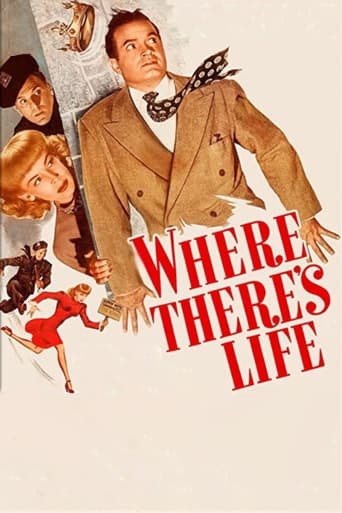Fuzzy Wuzzy
I guess in order to fully appreciate the likes of Bob Hope as a comedian (and admit that he's a funny guy), it all comes down to something of an acquired taste. But, with that said, even after seeing him in a number of films, I still haven't come anywhere near to acquiring that taste of total appreciation for this dude.To me, Bob Hope, far too often, comes across as being one of the driest, most bland, and most unfunny comics of his era. In fact, there are moments when Hope's screen-persona gives me the creeps, big-time, especially when his character is required (amongst other things) to be a hot-blooded lover-boy type to some semi-smouldering babe.From my point of view, Hope's apparent male-magnetism and believability as a virile specimen of raw manhood registers (on a scale of 1-10) at about 2. And 2 is also about the very same position where Hope's appeal as an all-round comic seems to sit, as well.In "Where There's Life", Hope is radio personality, Michael Valentine, on WKDC in New York.Valentine soon finds out (in a roundabout way) that he is the long-lost heir to the throne of the mythical kingdom of Borovia. This, in turn, makes him a target of spies, kidnapping, and death plots, as well as the desire of not one, but two, very determined women. (You go figure)
MartinHafer
This film is included on a DVD along with another one of Bob Hope's films, "Monsieur Beaucaire". Both are rather pleasant diversions, though neither are near Hope's best.The film begins in the fictional country of Barovia. The King is making a speech when he is unexpectedly shot. As he appears on the verge of death, the General (Signe Hasso) goes on a mission to America to find the King's son--a child conceived during a brief and ill-conceived marriage to a commoner. It turns out that Hasso is looking for Bob Hope and he has no idea that he's next in line for the throne. Unfortunately, an underground organization of evil, the Mordia, are also looking for Hope, as they are the ones who shot the King and they want to rule Barovia. Much of the film consists of Hope and Hasso running from these killers and it's all cute fun. When they fall in love, it's not especially hard to predict, though it did seem to come rather out of the blue. In other words, there wasn't much of a build up to this. Despite this, the plot still worked up until the very end. Sadly, however, the ending is a total let-down in every way. It's a shame, really, as up until then I liked the film a lot and thought it among Hope's better films. But, the dumb ending undid a lot of my good will and as a result it's just a time-passer...a time-passer that could have been better.
Jay Raskin
Bob Hope is always a wonderful comedian, but he has to work with a few handicaps here. First, there's a predictable and mundane script with a plot more fit for the Three Stooges than Hope. Second, the production values look awfully cheap. This looks more like Republic Pictures than Paramount. Third, co-star Signe Hasso is listless and grim, and has no chemistry with Hope at all. She is also saddled with a ridiculous and silly hairstyle. The only memorable delight in the film is William Bendix as a N.Y.City cop. His delivery of his signature line, "What a revolting development this is," is the funniest laugh in the movie. At 75 minutes, the film zips by and is pleasant enough, but not nearly as much fun as "Monsieur Beaucaire," "Paleface" or any of the Road pictures.
bkoganbing
The country of Barovia is in a real pickle. A terrorist organization called The Mordia threatens to take over especially after an assassination attempt on the last king, leaves him critically wounded and clinging to life. The king's only heir; the product of a youthful indiscretion when he was sowing some wild oats in America and guess who that is. General Signe Hasso in her best imitation of Greta Garbo in Ninotchka is sent to bring Hope back to Barovia.Hope, who's a radio host in New York and engaged to Vera Marshe, is less than enthusiastic about the job of king, especially with the Mordia trying to kill him. But there's Hasso so the situation does have its compensations.Where There's Life is an odd man out among Rapid Robert's films of the forties when Hope was at the high point of his career. It only runs for 75 minutes, unusually short for an A film. It's funny in a lot of spots, but not nearly as good as others he was doing at this time like Monsieur Beaucaire or The Paleface.Where There's Life does have some good supporting players for Hope and Hasso with Dennis Hoey, George Coulouris, and George Zucco as various Barovian nationals. And of course it has the incomparable William Bendix.Bendix, though a supporting actor at Paramount, was a star on radio with The Life of Riley at this time. He plays a New York City police officer and prospective brother-in-law to Hope. Devoted fans of Chester A. Riley will get to hear him utter his favorite radio catchphrase, 'what a revolting development this is.'Will Barovia get out of a Hopeless situation?



